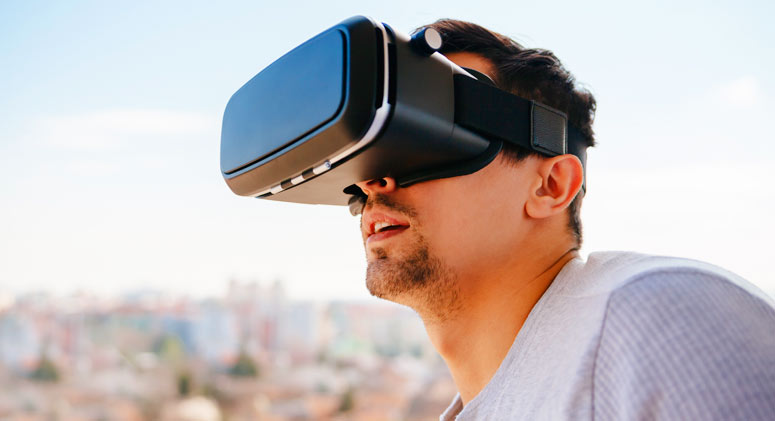Virtual Vacations: When the Destination Matters More than the Journey

In an age where everything is available online—education, personal finance, shopping, even doctor visits—is it possible to take a literal mental health day without actually having to physically leave your home?
“Wherever you go, there you are.”
The origins of this truism are a little difficult to trace (it could be Alcoholics Anonymous, but many will recognize it as the title of a major book on meditation). In any case, the wisdom of it should be familiar to anyone who went on a vacation, only to return home somehow feeling more tired, drained, and stressed than before “getting away from it all.”
For as much stock as we put in weekend-getaways and escaping from the ordinary, there is more to mental wellness than serene settings or a simple change of scenery. If vacations are about relaxation and rejuvenation, how can they leave us feeling ill?
You can change your location, but that isn’t the same as changing your mind.
We have a chronic disconnect in Western medicine, whereby we treat the body (physical symptoms) without necessarily giving a second thought to the mind. Emerging evidence is pointing at the mind-body connection as more than just a new-age fiction or an exclusively spiritual concept: we simply cannot treat one while ignoring the other any longer.
Enter the virtual vacation
The idea of a virtual vacation is hardly new, but practical Virtual Reality (VR) platforms are beginning to finally realize the potential of putting the mind—rather than the body—at the center of the travel experience.
The most ardent VR supporters and enthusiasts tend to be members of the gaming community. This makes some amount of sense, considering gaming on any platform provides a bit of escapist stimulation and fantasy-fulfillment. VR simply takes what for many is already an immersive experience to a new, more sophisticated level.
This immersive-interactive approach to VR has already gained some support in academic circles. Enterprising instructors are using VR platforms to take whole classrooms on virtual fieldtrips. Ordinary fare like a day at the zoo or a local history museum is supplanted by fully interactive tours of historical towns, an intergalactic ride through the stars, or even challenging construction projects.
And it isn’t just for kids: virtual classrooms and game-based learning are becoming a staple of progressive online degree programs, where students of all ages are finding it easier to balance work and life with their desire to go back to school.
In short, VR is beginning to overcome the physical limitations of the classroom and getting more people to learn in exciting new ways. For those who struggle to find the time for rest and relaxation, this could open the door to one of the time-tested fundamentals of mental wellness: meditation.
Reunite Mind and Body
VR-assisted meditation is not so much a virtual vacation as a tool to help users better realize—and focus on—their own happy place. Learning the fundamentals of meditation through VR isn’t just a matter of replacing vacations. Developing mindfulness and greater mental health awareness teach the skills needed to fully experience an actual vacation: travelers, for perhaps the first time, can truly be there, when they go there.
Traveling is hard on the body: jumping across time-zones, acclimating to different weather, navigating exotic cuisines; and every physical challenge is compounded with stress and emotional strain. VR vacations are on their way to becoming a more viable alternative for those who don’t want the hassle.
As the technology required to both create and experience fully-immersive VR becomes more sophisticated, affordable, and widely available, the creativity of amateurs and the enthusiasm of a growing consumer base will drive even greater innovation. Tactile elements could be incorporated (the feeling of sand between your toes, the caress of a warm breeze while walking along a beach, etc.) to make the experience more convincing.
In this way, virtual vacations amplify the mental relief and emotional centering of a traditional, “analog” vacation.
Just Be There
The old wisdom that the journey is more important than the destination doesn’t always apply in an age of instant gratification. But the problem isn’t that we don’t spend enough time getting to wherever we are going; it is that we don’t always spend enough time being there. And this is where the benefits of the virtual vacation truly shine: if getting there is simply a matter of pulling on a headset or firing up a VR program, being there can finally be the sole point of focus.
For anyone looking to focus on wellness or escape to a place of better health, this is an exciting development. As virtual vacations, guided meditation, and other mentally-focused programs emerge to take advantage of VR technology, the mind—rather than the body—may finally be back at the center of our experiences.
Interesting Virtual Reality Opportunities:
https://www.gearbrain.com/vr-travel-samsung-gear-vr-google-cardboard-1737536488.html
http://www.travelandleisure.com/travel-tips/cool-gadgets/virtual-reality-vacations
https://motherboard.vice.com/en_us/article/future-of-vacations-virtual-reality

Related Keywords







